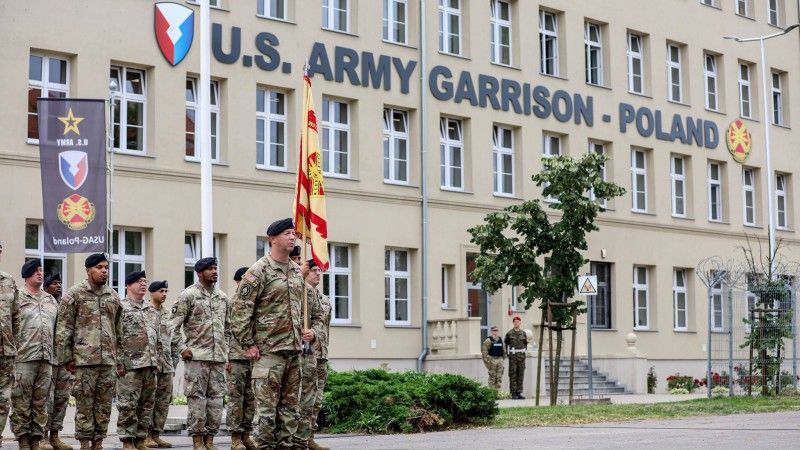Geopolitics
Military-civilian relations with the USA support Poland's resilience

Photo. US Army Garrison - Poland, oficjalne konto Facebook
Americans celebrated this year’s Independence Day in Powidz with the local community. But this type of event, as well as others similar to it, can be considered today in an expanded sense, as the necessary background for military-civilian relations. Moreover, it creates a kind of immunity to disinformation activities.
In Powidz, the US Army Garrison Poland and the Polish side organized a grand celebration of Independence Day for the first time as part of the „Polish-American Freedom Fest”. Of course, by the American standard, there was a fireworks display that could be envied in terms of the scale and duration of the pyrotechnic effects and the music from both countries. The event of July 4 this year can, of course, be treated in only superficial terms, considering that it is a natural progression of the development of the stationing of American soldiers in Poland.
American soldiers every day in Polish cities and towns
However, based on this event, we should also look at certain aspects that usually escape analysis of American-Polish relations from the defense perspective. First, there is a crucial space for integration between soldiers and local communities. This aspect was emphasized when the US Army Garrison commanders were changed in Poznań. Both commanders mentioned the importance of activities at the interface between the military and civilians.
Let us note that American officers and soldiers come to Poland and, of course, have their duties as part of their daily service. However, this service can be much more demanding regarding post-service life without a proper understanding of local communities. Poland is, therefore, faced with a situation where both large cities such as Poznań or Wrocław, but also Powidz, must create their approach to the development of the military presence of our ally. Fortunately, so far, most official and less official opinions indicate that this somewhat imperceptible task of the host nation is assessed very well. We are discussing several issues that may seem trivial but very important in the long term, from the linguistic and cultural space to social aspects and, more broadly, the comfort of life for themselves and often also for their families.
American bases in Poland are a target for Russians and Belarusians
Once again, it is worth recalling that we need to resist attempted actions taken by the Russians, Belarusians, and even the Chinese in this aspect. We need to note that we are talking directly about threats related primarily to the espionage activities of Russian and Belarusian intelligence services in Poland. The facilities used by the American and Polish-American cooperation sites are generally placed high on the agenda of SVR, KDB (Belarus), and GU/GRU activities.
In this case, the effectiveness of the counterintelligence cover will depend not only on our counterintelligence services and allied cooperation. The previously mentioned local communities and society undoubtedly have a significant role to play. However, if we expand the Russian-Belarusian duo to include the Chinese, we must speak directly about activities in the information domain. In the past, many American bases, as well as places where American soldiers were stationed (not only those from the US Army), were the target of attacks.
While attackers often use tools from the cyber-info domain (as in many countries, two domains). They are primarily aimed at causing tensions between the military and the civilian population. We cannot avoid similar discussions because we already have a rich dossier of similar attacks in Poland.
Once again, we return to resilience, seen from the perspective of places related to the stationing of American soldiers in Poland. To what extent are local communities and the entire society better prepared today for subsequent attacks, often associated with the activity of hostile, professional elements of psychological operations?
Celebrate together and act together
It can be said at this point that even celebrating July 4 together - as a critical American holiday - is an element of building the above-mentioned immunity. Our ally’s soldiers can be seen celebrating less formally, and, importantly, this contributes to creating a better atmosphere with the civilian population and local authorities.
Thus, even in crises, it will be more difficult for Russians, Belarusians, and even Chinese to make anti-NATO, anti-American and anti-Allied narratives resonate. The contrast will become noticeable between the local perception of people who come into contact with American soldiers daily and the activities of, for example, pro-Russian, pro-Chinese, and even pro-Belarusian circles on social media. Cognitive dissonance can be our defense from propaganda. Unfortunately, examples of more or less veiled activity of this type of influence agency in the Polish social media space are also no surprise.
Going further, such events are also an opportunity to notice that allied relations are not only summits and talks between state leaders. It is the final implementation of allied assumptions by soldiers, non-commissioned officers, and officers in places such as Powidz or Poznań. In this case, we have a feedback loop because after serving in Poland, Americans return to their communities scattered around the USA, presenting their feelings and subjective assessments about Poland and the region. At the end of this, there are, for example, the 2024 congressional and presidential elections. So soldiers after mission in Poland can play the role of our unofficial diplomats in their state. We need to remember that in the US, we can see a number of voices criticizing America’s extensive involvement in Central and Eastern European regions.
Small gestures and small communication between societies mean the detailed creation of a different image of allied cooperation, complementing conventional looking at maps and quantitative and qualitative analyses in command centers or political decision-making centers. Not to mention the space for understanding the community of values, which is the often overlooked bond of allied activities within bilateral and NATO relations.
Host nation with many challenges
To sum up, we and our American allies can wish for more events, such as celebrating together in Powidz on July 4, 2024. Apart from the space of celebration and good fun, creating appropriate relations between the military and civilians is one of the most critical activities supporting the practical actions of the US and the host country, in this case, Poland.
Especially since, for example, taking into account the experience from American bases in Japan, the Republic of Korea, Germany or Italy, sooner or later a moment of crisis will come. And without mutual understanding and the creation of this social fabric, any tension can lead to a crisis. Moreover, we are in a place of increased espionage activity, as well as PSYOPs of our opponents. Their goal is to directly undermine allied relations but also to act to cause the above-mentioned tensions at the local, regional, and national levels.
Well-constructed relations with authorities (including, let us emphasize, local ones), communities, and society can prevent not only disinformation but also constitute an essential weapon in counteracting more complicated operations, e.g., disintegration. Moreover, they create an understanding and perception of one’s needs. They can support building the necessary informal channels, which will be important in the event of a crisis and the need to cope with its dynamics.
The importance of Powidz is growing, and there is something to celebrate
Finally, such a grand celebration of July 4 in Powidz also requires us to repeat the importance of the American-Polish infrastructure in Poland. On July 2, two days before the holiday, Damian Ratka in Defence24 pointed out that „the US Army is starting the transfer of military equipment to the military equipment depot in Powidz. The facility in Poland is part of a broader system of equipment depots for American land forces in Europe as part of APS-2 ( Army Prepositioned Stock - 2).”
Damian Ratka later specified that „the APS-2 depot in Powidz will store equipment for the US Army armored brigade. „These will include the latest versions of various types of armored combat vehicles, M1A2SEPv3 main battle tanks, IFVs M2A4 (or A3) Bradley, M7A4 combat reconnaissance, and artillery fire control vehicles, specialized armored personnel carriers of the AMPV family, M109A7 self-propelled howitzers, and M88A2 technical support vehicles. , M1110 assault bridges, JLTV, etc. So we see the importance of the daily mission of the US Army Garrison Poland, not to mention the V Corps with its forward command in Poznań. Especially since equipment without people properly motivated and seeing the need for allied cooperation is just equipment.
